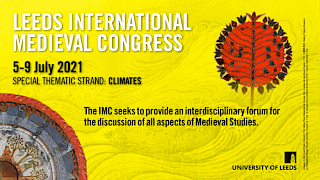7 July 2021 15:30 utc — view in local time
Trauma and transcience in Old English poetry and its influence
❧

28th annual International Medieval Congress
Climates are engendered by powerful interactions of heavens, oceans, and earth, and are themselves potent forces in complicated relationships with water, landscapes society, and economics. Medievalists study populations across the globe that understood this interconnectedness in multiple ways, invested causal and explanatory power in observable phenomena, and lived in communities that were both vulnerable and responsive to shifting environmental conditions. Climates — in the many senses of the word — are now among the most pressing issues of our times. Expertise on the medieval period is becoming increasingly important to scientific and public conversations, while intensifying global instability threatens both the future study of a period long synonymous with irrelevancy, and the preservation of its material remains.
‘Climates’ can be explored on many levels, from the planetary to the intimately local, offering alternative routes to explore ideas of centres and peripheries, agency and determinism, connectivities, interdependencies and comparisons, as well as what constitutes the ‘global’ in this period. It was within dynamic environments and ecosystems that humans lived, moved, organised themselves, developed cosmologies, philosophies, and theologies, created material objects, literatures, and other records, extracted and exchanged the resources of different regions, competed for land and power, and faced disaster, displacement, and violence.
Themes to be addressed may include, but are not limited to:
❧
Catherine J. Batt, Organiser; Jane Beal, Organiser; and Catherine J. Batt, Moderator/chair
The papers in this session address, severally and collectively, the nature and imaginative reach of the Pearl-poet’s treatment, in Middle English, of humanity’s encounters with the environment, and all consider aspects of the poems’ descriptive art. For Jane Beal, the topos of a waterside encounter in Pearl illuminates our understanding of Tolkien’s artistry. Mickey Sweeney considers how Sir Gawain’s representation of the fertile land yields new insights into perceptions of the environment and human experience across the genres of history and romance, while Ashley Bartelt’s work addresses how, in the poet’s work, the weather registers deeper moral and spiritual assaults on a vulnerable humanity.
❧
Andrew Higgins, Organiser & Moderator/chair
This session will address wider topics and new approaches to Tolkien’s medievalism, ranging from source studies and theoretical readings to comparative studies (including Tolkien’s legacy).
❧
Andrew Higgins, Organiser; and Yvette Kisor, Moderator/chair
Participants include Deidre Dawson, independent scholar; Sultana Raza, independent scholar; and Christopher T. Vaccaro, Senior Lecturer, University of Vermont.
This roundtable discussion will explore different and diverse contextual approaches to the works of Tolkien as well how educators and scholars constructively engage with the complex and often seemingly problematic representations of race and ethnicity in Tolkien’s works.
❧
Andrew Higgins, Organiser; and Sara Brown, Moderator/chair
Tolkien spent most of his lifetime inventing an extended mythology which displays an impressive array of secondary world infrastructures (Mark Wolf, Building Imaginary Worlds, Routledge, 2012). The richness of his world-building allows scholars to directly address the overall theme of this conference with papers exploring broad aspects of climate and its relationship and impact on the heavens, waters, landscapes, patterns of weather and peoples in Tolkien’s world-building as expressed through his narratives, language invention, and his own exploration and scholarship.
❧
Andrew Higgins, Organiser; and Kristine Larsen, Moderator/chair
Tolkien spent most of his lifetime inventing an extended mythology which displays an impressive array of secondary world infrastructures (Mark Wolf, Building Imaginary Worlds, Routledge, 2012). The richness of his world-building allows scholars to directly address the overall theme of this conference with papers exploring broad aspects of climate and its relationship and impact on the heavens, waters, landscapes, patterns of weather and peoples in Tolkien’s world-building as expressed through his narratives, language invention, and his own exploration and scholarship.
❧